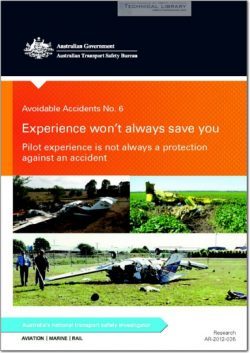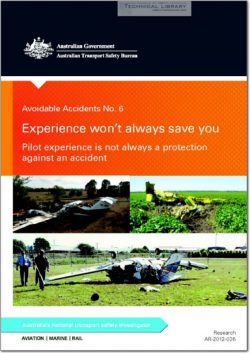ATSB-AR-2012-035

- Version
- 167 Downloads
- 5.94 MB File Size
- 1 File Count
- August 9, 2016 Create Date
- August 9, 2016 Last Updated
Avoidable Accidents No.6 Experience won't always save you - Pilot Experience is not always a Protection Against an Accident

As pilots, we are familiar with well—publicised events of aircrew who, as a result of their
experience and exceptional airmanship, avoided what could have been a disaster and
a tragic loss of life. Pilots, such as Captain ‘AI’ Haynes in command of a United Airlines
Douglas DC—1O on a flight from Denver to Chicago in July 1989, that had the fan wheel
of its number two (centre) engine disintegrate, causing a loss of all three of its hydraulic
control systems — an unprecedented problem that made the aircraft nearly impossible
to fly or land. Captain Haynes and his crew figured out how to gain some control of the
plane and were eventually able to get the severely disabled airliner to the Sioux City,
Iowa airport, where they crash—landed. The aircraft broke apart during the landing and
although there were 112 fatalities, a remarkable 185 people survived the crash.
More recent events, such as the US Airways Airbus A320 under the command of
Captain Chesley Sullenberger, an experienced pilot, who together with his co-pilot,
successfully ditched their stricken aircraft in the Hudson River after both its engines lost
power following multiple bird ingestion on takeoff from New York’s La Guardia airport
in January 2009. All the passengers and crew were rescued from the floating aircraft
without injury. Then there was the effort of Captain Richard de Crespigny and his crew
after the Qantas Airbus A380 they were flying experienced an uncontained engine
failurejust after departing Singapore’s Changi airport in November 2010. They guided
the heavily damaged aircraft back to a safe landing at Singapore, averting what could
have been a major catastrophe.
There have been many other individual acts of outstanding airmanship where
‘experience’ clearly played a part in the safe outcome. At the same time, a closer
analysis of events suggests that things other than experience alone had a hand in the
outcome. Good training, focussed preparation, a readiness for the unexpected and good
crew interaction also had a significant part to play. Unfortunately, those other factors
go mostly unreported in our media and the impression is created that mostly it is an
individual's experience that makes the difference.
In the same way, in those tragic cases where the outcome was a fatal accident, many
factors were in play. Naturally, media interest in an accident is heightened when it
involves an experienced pilot who is also a well—known aviation identity. Although this
adds a human interest aspect to the tragedy, the subsequent media reports often do
little to assist a thorough understanding of the circumstances that led to the accident.
| File | Action |
|---|---|
| ATSB-AR-2012-035 Avoidable Accidents No.6 Experience won't always save you - Pilot Experience is not always a Protection Against an Accident.pdf | Download |

Comment On This Post